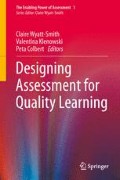Abstract
This chapter outlines a perspective of educational assessment as enabling, whereby the learner is central and assessment is focused on supporting the knowledge, skills and dispositions necessary for lifelong learning. It argues that better education for young people is achievable when educational policy and practice give priority to learning improvement, thereby making assessment for accountability a related, though secondary, concern. The chapter describes how this work of internationally recognized scholars brings together diverse perspectives and theoretical frameworks and, in so doing, provides readers with a range of ways to consider their pathway through the book. A ‘map’ and summaries of chapters suggest a reading according to a thematic approach, geographical setting, author/s profile or content purposes depending on the reader’s own priorities. A section on assessment past, present, and futures calls for a rebalancing of improvement and accountability goals, and for countries to be careful to avoid privileging large-scale testing over other forms of data about learning and achievement.
Access this chapter
Tax calculation will be finalised at checkout
Purchases are for personal use only
Notes
- 1.
For further information contact the series editor, Claire Wyatt-Smith, Claire.Wyatt-Smith@acu.edu.au
References
Ainscow, M. (2010). Achieving excellence and equity: Reflections on the development of practices in one local district over 10 years. School Effectiveness and School Improvement, 21(1), 75–91.
Bereiter, C. (2002). Education and mind in the knowledge age. Hillsdale: Erlbaum.
Bereiter, C., & Scardamalia, M. (1993). Surpassing ourselves. Chicago: Open Court.
Bishop, R., O’Sullivan, D., & Berryman, M. (2010). Scaling up education reform: Addressing the politics of disparity. Wellington: NZCER Press.
Bourdieu, P., & Passeron, J. C. (1990). Reproduction in education, society and culture (R. Nice, transl., 2nd edn). London: Sage.
Comber, B., & Kamler, B. (2004). Getting out of deficit: Pedagogies of reconnection. Teaching Education, 15(3), 293–310.
Connolly, S. (2012). ‘Students’ cultural capital: A study of assessment for learning as a field of exchange. Unpublished PhD thesis, Queensland University of Technology, Brisbane.
Cook, S., & Brown, J. (2005). Bridging epistemologies: The generative dance between organizational knowledge and organizational knowing. Organizational Science, 10(4): 381–400. <http://orgsci.journal.informs.org/content/10/4/381.short> Accessed 3 Nov 2009.
Cooksey, R., Freebody, P., & Wyatt-Smith, C. M. (2007). Assessment as judgement-in-context: Analysing how teachers evaluate students’ writing. Educational Research and Evaluation, 13(5), 401–434.
Hipwell, P., & Klenowski, V. (2011). A case for addressing the literacy demands of student assessment. Australian Journal of Language and Literacy, 34(2), 127–146.
Kimber, K., & Wyatt-Smith, C. (2010). Student assessment and digital futures. How shall we know them? In G. Finger & M. Lee (Eds.), The Home–School Nexus: The development of networked school communities (pp. 259–276). Camberwell: ACER Press.
Klenowski, V., & Wyatt-Smith, C. M. (2014). Standards, moderation and teacher judgement: Policy and practice. London: Sage.
Luke, A., Cazden, C., Coopes, R., Klenowski, V., Ladwig, J., Lester, J., MacDonald, S., Phillips, J., Shield, P., Spina, N., Theroux, P., Tones, M., Villegas, M., & Woods, A. (2013). A summative evaluation of the stronger smarter learning communities project, March 2013 Report, Volume 1. Brisbane: Queensland University of Technology.
Mahuika, R., Berryman, M., & Bishop, R. (2011). Issues of culture and assessment in New Zealand education pertaining to Mãori students. Assessment Matters, 3, 183–198.
MCEEDYA, Ministerial Council for Education, Early Childhood Development and Youth Affairs. (2009). Aboriginal and Torres Strait Islander Education Action Plan 2010–2014. Canberra: MCEEDYA.
NRC, National Research Council. (2011). Incentives and test-based accountability in education. Washington, DC: National Academy Press.
OECD, Organization for Economic Co-operation and Development. (2005). The Measurement of Scientific and Technological Activities: Guidelines for collecting and interpreting innovation data: Oslo Manual (3rd edn, prepared by the Working Party of National Experts on Scientific and Technology Indicators). Paris: OECD.
OECD. (2013). Synergies for Better Learning: An International Perspective on Evaluation and Assessment Synergies for Better Learning. Report on Evaluation and Assessment Frameworks for Improving School Outcomes. <www.oecd.org/site/eduistp13/Synergies%20for%20Better%20Learning%20-%20Policy%20Pointers.pdf> Accessed 17 April 2013.
Paavola, S., & Hakkarainen, K. (2005). The knowledge creation metaphor-An emergent epistemological approach to learning. Science & Education, 14, 535–557.
Sadler, D. R. (1989). Formative assessment and the design of instructional systems. Instructional Science, 18, 119–144.
Vygotsky, L. S. (1986). Thought and language. Boston: MIT Press.
Wyatt-Smith, C. M., & Cumming, J. J. (2003). Curriculum literacies: Expanding domains of assessment. Assessment in Education: Principles, Policy and Practice, 10(1), 47–59.
Wyatt-Smith, C. M., & Klenowski, V. (2013). Explicit, latent and meta-criteria: Types of criteria at play in professional judgement. Assessment in Education: Principles, Policy and Practice, 20(1), 35–52.
Author information
Authors and Affiliations
Corresponding author
Editor information
Editors and Affiliations
Rights and permissions
Copyright information
© 2014 Springer Science+Business Media Dordrecht
About this chapter
Cite this chapter
Wyatt-Smith, C., Klenowski, V., Colbert, P. (2014). Assessment Understood as Enabling. In: Wyatt-Smith, C., Klenowski, V., Colbert, P. (eds) Designing Assessment for Quality Learning. The Enabling Power of Assessment, vol 1. Springer, Dordrecht. https://doi.org/10.1007/978-94-007-5902-2_1
Download citation
DOI: https://doi.org/10.1007/978-94-007-5902-2_1
Published:
Publisher Name: Springer, Dordrecht
Print ISBN: 978-94-007-5901-5
Online ISBN: 978-94-007-5902-2
eBook Packages: Humanities, Social Sciences and LawEducation (R0)

